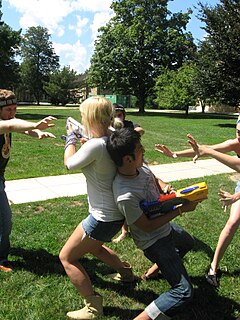 W
WA carnival game is a game of chance or skill that can be seen at a traveling carnival, charity fund raiser, amusement arcade and amusement park, or on a state and county fair midway. They are also commonly played on holidays such as Mardi Gras, Saint Patrick's Day, and Oktoberfest.
 W
WA game of chance is a game whose outcome is strongly influenced by some randomizing device. Common devices used include dice, spinning tops, playing cards, roulette wheels, or numbered balls drawn from a container. A game of chance may be played as gambling if players wage money or anything of monetary value.
 W
WA game of skill or game of wits is a game where the outcome is determined mainly by mental or physical skill, rather than chance.
 W
WHumans vs. Zombies is a live-action game predominantly played at US college campuses. The storyline of the game dictates that players begin as Humans and try to survive a Zombie invasion. The ultimate goal of the game is for either all Humans to be turned into Zombies, or for the humans to survive a set amount of time. Humans can defend themselves using any item that is approved by a moderator and thereby deemed safe and appropriate. The most common equipment includes balled up socks, marshmallows, and foam dart blasters. Humans may throw or launch these items at Zombies, who become stunned once hit. Safe zones are also established so that players can eat and sleep in safety. Zombies, on the other hand, are unarmed and must tag Humans to gain a kill. In some cases, if a kill is not made within a set time period, Zombies "starve" and are removed from the field of play.
 W
WImmersion into virtual reality (VR) is a perception of being physically present in a non-physical world. The perception is created by surrounding the user of the VR system in images, sound or other stimuli that provide an engrossing total environment.
 W
WA location-based game is a type of pervasive game in which the gameplay evolves and progresses via a player's location. Thus, location-based games must provide some mechanism to allow the player to report their location, frequently this is through some kind of localization technology, for example by using satellite positioning through GPS. "Urban gaming" or "street games" are typically multi-player location-based games played out on city streets and built up urban environments. Various mobile devices can be used to play location-based games; these games have been referred to as "location-based mobile games", merging location-based games and mobile games.
 W
WA parlour or parlor game is a group game played indoors. They were often played in a parlour. These games were extremely popular among the upper and middle classes in Great Britain and in the United States during the Victorian era.
 W
WA play-by-mail game is a game played through postal mail, email or other digital media. Correspondence chess and Go were among the first PBM games. Diplomacy has been played by mail since 1963, introducing a multi-player aspect to PBM games. Flying Buffalo Inc. pioneered the first commercially available PBM game in 1970. A small number of PBM companies followed in the 1970s, with an explosion of hundreds of startup PBM companies in the 1980s at the peak of PBM gaming popularity, many of them small hobby companies—more than 90 percent of which eventually folded. A number of independent PBM magazines also started in the 1980s, including Flagship magazine, Gaming Universal, and Paper Mayhem. These magazines eventually went out of print, replaced in the 21st century by the online PBM journal Suspense and Decision.
 W
WA pocket box is a small box or pocket-sized container, so named to emphasise its portability.
 W
WIn games, score refers to an abstract quantity associated with a player or team. Score is usually measured in the abstract unit of points, and events in the game can raise or lower the score of different parties. Most games with score use it as a quantitative indicator of success in the game, and in competitive games, a goal is often made of attaining a better score than one's opponents in order to win.
 W
WA singing game is an activity based on a particular verse or rhyme, usually associated with a set of actions and movements. They have been studied by folklorists, ethnologists and psychologists and are seen as important part of childhood culture. The same term is also used for a form of video game that involves singing.
 W
WA street game or street sport is a sport or game that is played on city streets rather than a prepared field. Street games are usually simply play time activities for children in the most convenient venue. Some street games have risen to the level of organized tournaments, such as stickball.